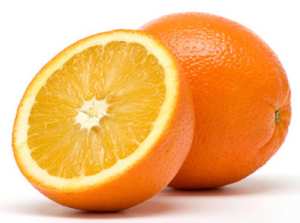

MedFriendly®


Vitamin C
Vitamin C. Everywhere you look in the grocery store,
you see it added to all sorts of foods. It is also naturally
present in many foods such as oranges, grapefruits,
other citrus fruits, berries, apple juice, potatoes,
tomatoes, asparagus, cabbage, collared greens,
broccoli, cauliflower, brussels sprouts, parsley, snow
peas, sweet peppers, and many many more. But what
exactly is vitamin C? Well, to begin with, vitamin C is of
course, a vitamin. This means that it is one of a group
of substances made up partly of carbon that are
essential in small amounts for normal bodily functioning
and chemical processes in the body to take place.
Oranges are a great source of
vitamin C.
FEATURED BOOK: Vitamin C: The Real Story
WHY ELSE IS VITAMIN C IMPORTANT?
Along with other vitamins and nutrients, vitamin C helps fight bacterial infections. It is
crucial for the creation of proteins that make up tendons, as well as fibrous tissue for the
normal intercellular substances in cartilage, skin, bone, teeth, connective tissue, and for
the structure of the walls of capillaries (types of blood vessels).
WHAT IF I DON'T GET ENOUGH VITAMIN C?
Since we mentioned that vitamin C is essential, you may be wondering what would
happen if you did not get enough of it.
"Where Medical Information is Easy to Understand"™
Well, signs of too little vitamin C are a tendency to bruise easily, an
increased chance of getting infections, bleeding gums, joint pain or
joint swelling, nosebleeds, and slow healing of fractures and other
wounds. A vitamin C deficiency can also result in anemia, in which
there is a decrease in red blood cells, total amount of blood, or an
iron containing substance in the blood called hemoglobin.
If the vitamin C deficiency were severe enough, it would result in a
disease called scurvy, which is characterized by tiredness, swelling,
loosening of the teeth, hardening of leg muscles, and other
unpleasant symptoms.
WHAT IF I DON'T GET ENOUGH VITAMIN C?
Since we mentioned that vitamin C is essential, you may be wondering what would happen if you did not
get enough of it. Well, signs of too little vitamin C are a tendency to bruise easily, an increased chance of
getting infections, bleeding gums, joint pain or joint swelling, nosebleeds, and slow healing of fractures and
other wounds. A vitamin C deficiency can also result in anemia, in which there is a decrease in red blood
cells, total amount of blood, or an iron containing substance in the blood called hemoglobin. If the vitamin
C deficiency were severe enough, it would result in a disease called scurvy, which is characterized by
tiredness, swelling, loosening of the teeth, hardening of leg muscles, and other unpleasant symptoms.
WHAT IF I GET TOO MUCH VITAMIN C?
Too much vitamin C can lead to diarrhea, nausea, a burning sensation during urination, and one or more
skin rashes. Too much vitamin C can also interfere with the absorption and chemical processes involving
cyanocobalamin, a red substance that works like vitamin B. In addition, an excess of vitamin C can
interfere with the results of tests for iron, uric acid (a substance in the blood and urine), and an abnormal
presence of sugar in the urine. Some doctors give patients excess amounts of vitamin C in order to make
the urine more acidic. More acid in the urine can prevent bacteria from staying in the urinary tract,
because the acid is harmful to the bacteria.
WHY IS VITAMIN C ADDED TO CERTAIN FOODS?
When you go to the grocery store and see that vitamin C is added to some of your favorite foods that
contain fats or oils, a major reason is because vitamin C is an antioxidant. This means that vitamin C
prevents oxygen from combining with fatty molecules, which would cause the food to go bad.
WHAT ARE SOME OTHER INTERESTING FACTS ABOUT VITAMIN C?
Other interesting facts about vitamin C are that (a) it has a white crystal-like appearance; (b) it is called
"water-soluble," because it dissolves in water; and (c) it is considered a strong reducing agent, which
means that it gives electrons to another substance in a chemical reaction.
WHY IS IT CALLED VITAMIN C?
Vitamin comes from the Latin word "vita" meaning "life," and the German word "amin" referring to the false
notion that these substances all contain amino acids. The letter "C" is simply used for classification
purposes.
WHAT ELSE IS VITAMIN C CALLED?
Vitamin C is also known as ascorbic acid, antiscorbutic vitamin, and cevitamic vitamin. And finally, for all
of you chemistry fans out there, vitamin C is known as 2,3-didehydro-L-threo-hexono-1,4-lactone.















